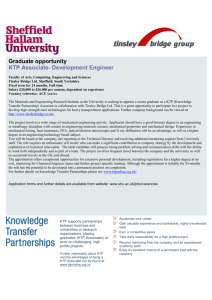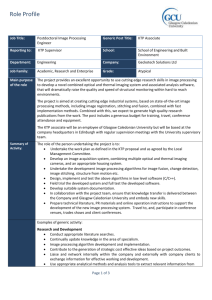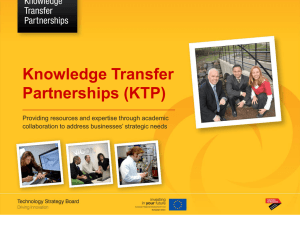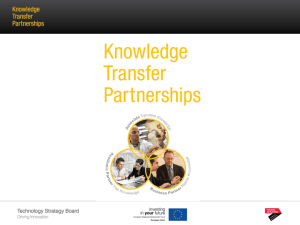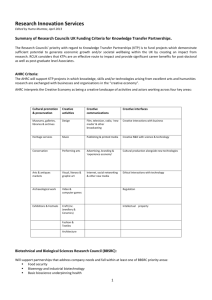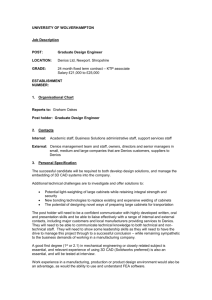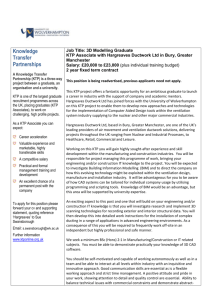Knowledge Transfer Program
advertisement
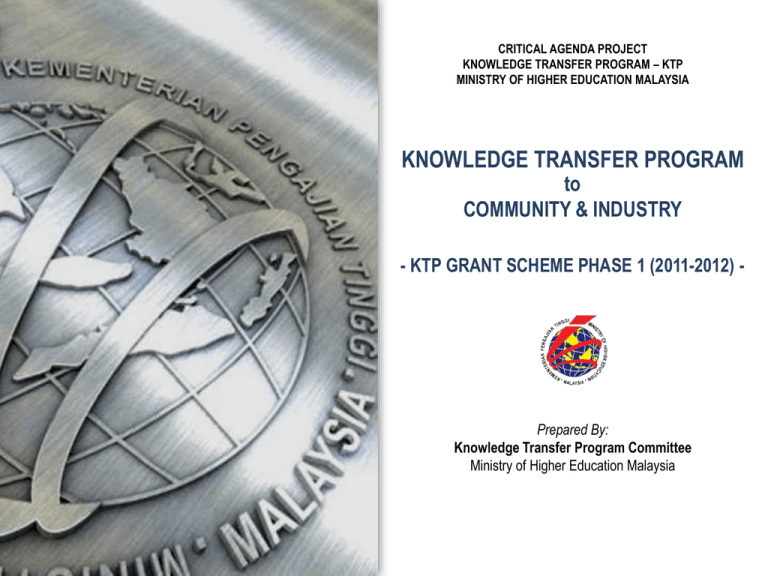
CRITICAL AGENDA PROJECT KNOWLEDGE TRANSFER PROGRAM – KTP MINISTRY OF HIGHER EDUCATION MALAYSIA KNOWLEDGE TRANSFER PROGRAM to COMMUNITY & INDUSTRY - KTP GRANT SCHEME PHASE 1 (2011-2012) - Prepared By: Knowledge Transfer Program Committee Ministry of Higher Education Malaysia Knowledge Transfer Program - KTP KTP Grant Scheme Phase 1 (2011-2012) CONTENT 1. 2. 3. Overview The Workshop Policy 4. 5. Key Result Area (KRA) Model of Implementation 6. 7. 8. Implementation Plan Impact Measurement Examples Impact of KTP 9. Roll-Out Plan (2011 – 2012) 10. KTP Projects Knowledge Transfer Program - KTP KTP Grant Scheme Phase 1 (2011-2012) OVERVIEW • In a high income economy the demand for knowledge workers will increase. • Educational reforms will be a vital need for inclusive growth. • Human capital policies must be given top priority, as they will be crucial in making more rapid inroads towards reducing income inequality. • Labour market imperfections, including wage and employment discrimination, will have to be rectified. • Fragmented and segmented labour markets must be made more integrated. (NEM 92) • While innovative ideas and knowledge may be converted into lucrative commercial undertakings, there would also be many incidences of failure which need to be managed. Above all, intellectual property rights (IPR) and other rights should be protected. (NEM 99) Knowledge Transfer Program - KTP KTP Grant Scheme Phase 1 (2011-2012) OVERVIEW (CONT’D) • • MoHE plans to formulate a new policy of KTP in view of establishing a New CAP for PSPTN The new CAP would outline the importance of KTP to be adopted by HEIs in particular the Public Universities Requirements • How Malaysians HEIs can assist in delivering and transferring knowledge created in their institutions to the industry and or community. • Differentiation need to be made as not to overlap with other CAPs which can also contain elements of KT such as commercialization, entrepreneurship and employability CAPs. • The knowledge to be transferred need to be based on certain fundamentals which need to be determined. Knowledge Transfer Program - KTP KTP Grant Scheme Phase 1 (2011-2012) THE WORKSHOP • The initial meeting on KTP with the Minister of Higher Education was held on last 11 November 2010 and the Minister has decided that the needs of the workshops on KTP to be held in order to outlined the goals, scopes, directions and the guidelines for the implementation programme of KTP. • • 1st Workshop 29-30 November 2010 (Concorde Inn, KLIA) 2nd Workshop 26-27 January 2011 (Marriott Hotel Putrajaya) Knowledge Transfer Program - KTP KTP Grant Scheme Phase 1 (2011-2012) THE WORKSHOP (CONT’D) - 1ST WORKSHOP 29-30 NOVEMBER 2010 (CONCORDE INN, KLIA) • 2-days workshop, which includes main presentation from USM, followed by discussion in 2 separate groups in parallel session focuses on Social Innovation to the Community and Technology Innovation to the Industry. Outputs from both groups were discussed to determine the draft policy of KTP. Objective • The objective of the workshop is to streamline the broad definition of KTP and achieved the following: • To outline the project draft policy for KTP. • To discuss and focus on community-based program - Social Innovation to the Community. • To discuss and focus on the industry-based program - Technology Innovation to the Industry. Knowledge Transfer Program - KTP KTP Grant Scheme Phase 1 (2011-2012) THE WORKSHOP (CONT’D) - 1ST WORKSHOP 29-30 NOVEMBER 2010 (CONCORDE INN, KLIA) Knowledge Transfer Program - KTP KTP Grant Scheme Phase 1 (2011-2012) THE WORKSHOP (CONT’D) - 2ND WORKSHOP 26-27 JANUARY 2011 (MARRIOTT HOTEL PUTRAJAYA) • 2-days workshop, which includes the discussion to recap the previous agenda and the output based on the early workshop, followed by discussion to refine the project policy for KTP and the discussion, focuses on to establishing the project roll-out plan for KTP. Objective • The objective of the workshop is to define the project roll out of KTP and achieved the following: • To refine the project draft policy for KTP that has been made during the early workshop. • To outline the project partnership framework, criteria for selection of projects and KPI for KTP. Knowledge Transfer Program - KTP KTP Grant Scheme Phase 1 (2011-2012) THE WORKSHOP (CONT’D) - 2ND WORKSHOP 26-27 JANUARY 2011 (MARRIOTT HOTEL PUTRAJAYA) Knowledge Transfer Program - KTP KTP Grant Scheme Phase 1 (2011-2012) POLICY • KTP Policy Outline • Background of KTP • Objective of KTP • Current status of KTP of IPTA in Malaysia • Issues and Challenges • Rationale of the Policy • SWOT Analysis • Strategic Thrusts of the Policy • Strategic Objective 1: Enhance and Enrich Current Knowledge Transfer in IPTA • Strategic Objective 2: KTP as Catalyst for Community or Industry Growth • Framework of the Policy • Roll-out and Milestone and Achievements Knowledge Transfer Program - KTP KTP Grant Scheme Phase 1 (2011-2012) BACKGROUND OF KTP • KTP recognises a broad range of activities to support mutually beneficial collaborations between universities, industries and communities (government agencies / non-government organisation (NGOs) / public sector). • It provides the platform for the exchange of tangible and intangible intellectual property, expertise, learning and skills between academia, industry and the community. • The forms of interactions may include, joint research, consultancy, education, training, graduate development, conferences, sharing of physical facilities and student placements. POLICY Knowledge Transfer Program - KTP KTP Grant Scheme Phase 1 (2011-2012) BACKGROUND OF KTP (CONT’D) • Public Higher Education Institutions (IPTA) should effectively engage with industry and community towards mutually beneficial initiatives through role played by: • Academia: able to incorporate relevant and up to date knowledge from industry and the community into their teaching, learning, research and consultancy activities. • Industry : can utilize the resources of IPTA to enhance their business capability and economic activities • Community: can benefit from the knowledge generated in IPTA to improve quality of life within the community. • Graduate/Postgraduate Intern : enhance their personal and professional development POLICY Knowledge Transfer Program - KTP KTP Grant Scheme Phase 1 (2011-2012) OBJECTIVE OF KTP • To recognise and promote the transfer of knowledge via the exchange of creative and innovative ideas, research findings, experiences and skills between IPTA, research organisations, industries, government agencies and the wider community. POLICY Knowledge Transfer Program - KTP KTP Grant Scheme Phase 1 (2011-2012) GOAL OF KTP • To enable the development and improvement of the quality of products, services and policies to be shared for mutual benefits between the stakeholders i.e. academia, industry, community and the graduate/postgraduate intern. POLICY Knowledge Transfer Program - KTP KTP Grant Scheme Phase 1 (2011-2012) CURRENT STATUS OF KTP OF IPTA IN MALAYSIA • IPTA do implement KTP, however they are not comprehensive. • The practices and approach vary among the IPTA. • Poor correlation between investment in time and resources versus the impact currently produced. • Thus there is a need for a structured and systematic national KTP framework. POLICY Knowledge Transfer Program - KTP KTP Grant Scheme Phase 1 (2011-2012) ISSUES AND CHALLENGES • Issues • Mismatch between the needs of the industry and the available resources in IPTA. • Communication problems among stake holders. • Lack of access to information among parties involved. • Challenges • Insufficient expertise in IPTA in some sectors. • Convincing the industry that grades is not the only factor for internship eligibility. • Industry perception of “subsidised rate” for consultancy work by IPTA. • Lack of laboratory certification IPTA. • Lack of readiness and willingness of industry/IPTA to share their expertise and facilities. POLICY Knowledge Transfer Program - KTP KTP Grant Scheme Phase 1 (2011-2012) RATIONALE OF THE POLICY • To encourage and recognise engagement between industry/community and academia in order to support the implementation of New Economic Model (NEM) in creating a knowledgeable and high income nation. • To provide a meaningful platform of exchange that facilitates the identification and matching of appropriate expertise in IPTA to address industry and community needs. • To optimise the potential of IPTA expertise through coordinated interactions with stakeholders. • To nurture the interactions between the stakeholders for sustainable and productive partnerships. POLICY Knowledge Transfer Program - KTP KTP Grant Scheme Phase 1 (2011-2012) SWOT ANALYSIS STRENGTH Expertise and Capacity of academic and nonacademic in the University University as the pool of innovative ideas Abundance of volunteerism among university students and staff The autonomy to engage the community Long and proven track records in community engagement and services WEAKNESS Lack of formalization of partnership and commitment from the experts in the University. Measurement of impact social innovation projects especially the intangibles. Documentations of all KTP projects. Wide and varying definition of the scope of the knowledge transfer. No clear connection with the target groups Level of rewards and recognition varies between universities. Lack of governance and leadership at University level in support of KTP in community engagement. Varying ecosystem within individual universities OPPORTUNITIES Potential to enhance & enrich current knowledge through KTP initiative exist The need to preserve good and noble values and passion in existing initiatives. Enhancing meaningful community services in community engagement. Paradigm shift from current service-oriented to scholarly-oriented community project. Empowerment and capacity building of the recipient groups. Possible partnership with more focused NGOs Reciprocity of knowledge transfer and exchange THREAT No clear policy in existence to support KTP in community Reluctance of the academic staff to engage in the knowledge transfer. Lack of commitment and support by certain industry on community engagement. POLICY Knowledge Transfer Program - KTP KTP Grant Scheme Phase 1 (2011-2012) STRATEGIC THRUSTS OF THE POLICY • Enriching the quality of human capital in IPTA, industries and communities via knowledge transfer including teaching, learning, research and services. • Strengthening accessibility of knowledge transfer from IPTA to spur industry growth, community development and quality of life. POLICY Knowledge Transfer Program - KTP KTP Grant Scheme Phase 1 (2011-2012) STRATEGIC OBJECTIVE 1: ENHANCE & ENRICH CURRENT KNOWLEDGE TRANSFER IN IPTA • Through • Identifying and implementing potential project, • Strengthening both curriculum and co-curriculum in IPTA based on industry and community, • Building capacity of academic and student in IPTA, • Integrating KTP initiatives of IPTA into academic program of other related institution of learning, • Shifting the current service-oriented to scholarly-oriented community project with outcome to the target group. POLICY Knowledge Transfer Program - KTP KTP Grant Scheme Phase 1 (2011-2012) STRATEGIC OBJECTIVE 2: KTP AS CATALYST FOR COMMUNITY OR INDUSTRY GROWTH Through : • Implementing meaningful projects with industry or community which are sustainable and have measurable outcome, • Empowerment and capacity building of the recipient industry or groups. • Strategic partnership with stakeholders, • Reciprocity of knowledge transfer initiatives between stakeholders. POLICY Knowledge Transfer Program - KTP KTP Grant Scheme Phase 1 (2011-2012) FRAMEWORK OF THE POLICY • • • • • • Establish partnership framework Criteria for selection of projects • The organisation must have a specific business need which will be enhanced through the KTP • IPTA must have competency to meet the organisation's business need Establish KTP programme committee. Establish permanent secretariat for KTP at USM Briefing and buy-in by stake holders National roll-out for KTP projects POLICY Knowledge Transfer Program - KTP KTP Grant Scheme Phase 1 (2011-2012) ROLL-OUT AND MILESTONE AND ACHIEVEMENTS Action Timeline Responsibility Establish partnership framework Jan 2011 USM & MoHE Criteria for selection of projects Jan 2011 USM & MoHE Establish KTP programme committee Mac 2011 USM & MoHE Establish permanent secretariat for KTP at Mac 2011 USM USM & MoHE Briefing and buy-in by stake holders Mac 2011 USM & IPTA National roll-out for KTP projects Mei 2011 IPTA POLICY Knowledge Transfer Program - KTP KTP Grant Scheme Phase 1 (2011-2012) KEY RESULT AREA (KRA) 5 KRA identified are in the fields of: EDU • Education – raising level of education in certain areas ECO • Economic gains for sector/s of industry in identified sector GT • Sustainability and Green Technology Initiatives DG • The Disadvantage groups IRC • Developing Industry Relevant curriculum (For High Impact sector) Knowledge Transfer Program – KTP Grant Scheme Phase 1 (2011-2012) MODELS OF IMPLEMENTATION o KTP Programme shall includes the involvement of the following : KTP ACADEMIA KPI MEASUREMENT KTP INTERN KTP INDUSTRY / COMMUNITY Lecturer or university's staff identified in the KTP Programme Graduated Interns and Post Graduate Interns Identified by KTP-IPTA o The project = the identified KTP Programme per location/firm/ community/target group. o Project may be replicated to other identified KTP Project of similar nature but different location/firm/community/target group. o KTP project committee is allowed to vary the provisions of financial limit after considerations of nature of projects. Knowledge Transfer Program - KTP KTP Grant Scheme Phase 1 (2011-2012) MODEL OF IMPLEMENTATION (CONT’D) Academia STRATEGIC INNOVATION Graduate / Postgraduate Intern Community/ Industry Knowledge Transfer Program - KTP KTP Grant Scheme Phase 1 (2011-2012) IMPLEMENTATION PLAN • The projects for the first phase of the 10th Malaysian Plan would be roll-out based in the following detail with the cost breakdown for the implementation plans is as follows: DURATION 2 years (2011-2012) IPTAS INVOLVED 20 COST PER PROJECT (RM) Salary or subsistence of the KTP Intern The overhead and administrative of project Costs of the Intern’s training and development Administrative support Knowledge Transfer Program - KTP KTP Grant Scheme Phase 1 (2011-2012) IMPACT MEASUREMENT • KRA will be determined by MoHE • Impact measurement to be approved by KTP Project Committee • Impact measurement – Quarterly Basis through : i. Periodic Progress Report ii. Partners Feedback Report (Industry / Community) Knowledge Transfer Program - KTP KTP Grant Scheme Phase 1 (2011-2012) EXAMPLE IMPACT OF KTP KRA Impact Measurement Proxy Indicator (Intermediate Measurement) Education – raising level of education in certain areas % improvement in public examination identified Progress in school based assessment Economic gains for sector/s of % of increase of profit or industry in identified sector income generated 3 month cash flow average or Financial ratios Sustainability and Green Technology Initiatives % of increase of profit or income generated Measurement related to the technology infused - e.g. reduction in energy bill The Disadvantage groups % of increase in annual income for target groups Periodical reports attest by social department Developing Industry Relevant curriculum (For High Impact sector) Acceptance of curriculum by industry and applied by Education institutions Progress reporting Knowledge Transfer Program - KTP KTP Grant Scheme Phase 1 (2011-2012) ROLL-OUT PLAN (2011-2012) • • • • • • Request for proposal from IPTA (Bottom Up) Differentiation between industry and community Criteria for application (Definition of the grant) Criteria for evaluation (Review) Procedure for application and evaluation Monitoring and disbursement of KTP Knowledge Transfer Program - KTP KTP Grant Scheme Phase 1 (2011-2012) Request for Proposal from IPTA (Bottom Up) • Individual or a group of academic • Supporting collaborative industry documentation (agreement, MoA, Letter of Intent, letter of agreement, letter of award • Supporting collaborative community documentation (letter of request from community) • Proof of graduate intern involvement Knowledge Transfer Program - KTP KTP Grant Scheme Phase 1 (2011-2012) Differentiation between Industry and Community • Definition of community and industry • Timeline • Tangible versus intangible output • Commercialization and non-commercialisation project • Profit and non-profit • Contribution from industry and or community in monetary and non-monetary forms Knowledge Transfer Program - KTP KTP Grant Scheme Phase 1 (2011-2012) Criteria for Application (Definition of the Grant) • Grant will not be disburse if applicant have other grant including research • Basic criteria's for application for FRGS would be used. (Graduate intern replace Human Capital) • Timeline not more than 2 years Knowledge Transfer Program - KTP KTP Grant Scheme Phase 1 (2011-2012) Criteria for Evaluation (Review) • Based on 5 KRA mentioned earlier • Output • Impact • Viability and sustainability • Capacity building • Improved products, services and policies • Level of commitment industry/community • Minimum of 30 % project cost for industry • For community, commitment from community leader , relevant government agencies and other institutions (including non-monetary contribution) • potential for replication and advancement Knowledge Transfer Program - KTP KTP Grant Scheme Phase 1 (2011-2012) GENERAL COMMENTS OF PANELS • Project is more on research-based and consultancies-driven. • The Knowledge Transfer-driven is low and not justified • The objective is not in line with the KTP requirement • The output/impact is not quantified • Incomplete information of intern (No academic qualification & year of graduation and no signature) • There is no evidence of industry commitment. no supporting document from the commitment partner Knowledge Transfer Program - KTP KTP Grant Scheme Phase 1 (2011-2012) Procedure for Application and Evaluation Will consist of the following: • Application • Concept of KTP • Definition of KTP grant • Purpose of KTP grant • KRA of KTP • Condition for application • Procedure of application • Evaluation criteria • Financial and budgetary consideration • Output of project (No. involve) • Outcome/impact of project (benefit) • Announcement date of opening and closing • • • • Evaluation Monitoring Result and disbursement of grant Other matter KTP INDUSTRY GUIDELINES KTP INDUSTRY APPLICATION FORM KTP COMMUNITY GUIDELINES KTP COMMUNITY APPLICATION FORM Knowledge Transfer Program - KTP KTP Grant Scheme Phase 1 (2011-2012) Monitoring and Disbursement of KTP • Monitoring based on: • Project performance • Financial performance • Quarterly progress report • Disbursement based on: • Letter of Acceptance ad agreement signed and disbursed fully (depending financially) Knowledge Transfer Program – KTP Grant Scheme Phase 1 (2011-2012) TOTAL OF APPLICATION INDUSTRY- 95 COMMUNITY - 230 Total of Application = 325 Knowledge Transfer Program – KTP Grant Scheme Phase 1 (2011-2012) SUMMARY OF KRA NO. KRA INDUSTRY COMMUNITY 1. Education – Raising level of education in certain areas. 14 118 2. Economic gains for sectors of industry/ community in identified sectors 52 54 3. Sustainability and Green Technology Initiatives 23 34 4. The Disadvantages Groups 2 20 5. Developing Industry Relevant Curriculum (for High Impact Sector) 4 4 95 230 TOTAL Knowledge Transfer Program – KTP Grant Scheme Phase 1 (2011-2012) PROJECT SELECTED COMMUNITY - 16 INDUSTRY- 28 Total of Project = 44 Knowledge Transfer Program - KTP Grant Evaluation and Project Management KTP’S INDUSTRY PROJECTS BASED ON KRA NO. KRA TOTAL 1. Education -Raising level of education in certain areas 5 2. Economic gains for sectors of industry in identified sector 12 3. Sustainability and Green technology Initiatives 11 4. The Disadvantage groups 0 5. Developing Industry Relevant Curriculum (for High Impact sector) 0 TOTAL 28 Knowledge Transfer Program - KTP Grant Evaluation and Project Management KTP’S COMMUNITY PROJETCS BASED ON KRA NO. KRA TOTAL 1. Education -Raising level of education in certain areas 6 2. Economic gains for sectors of community in identified sector 4 3. Sustainability and Green technology Initiatives 2 4. The Disadvantage groups 2 5. Developing Community Relevant Curriculum (for High Impact sector) 2 TOTAL 16 Knowledge Transfer Program - KTP KTP Grant Scheme Phase 1 (2011-2012) Give a man a fish and you feed him for a day. Teach him how to fish and you feed him for a lifetime…
